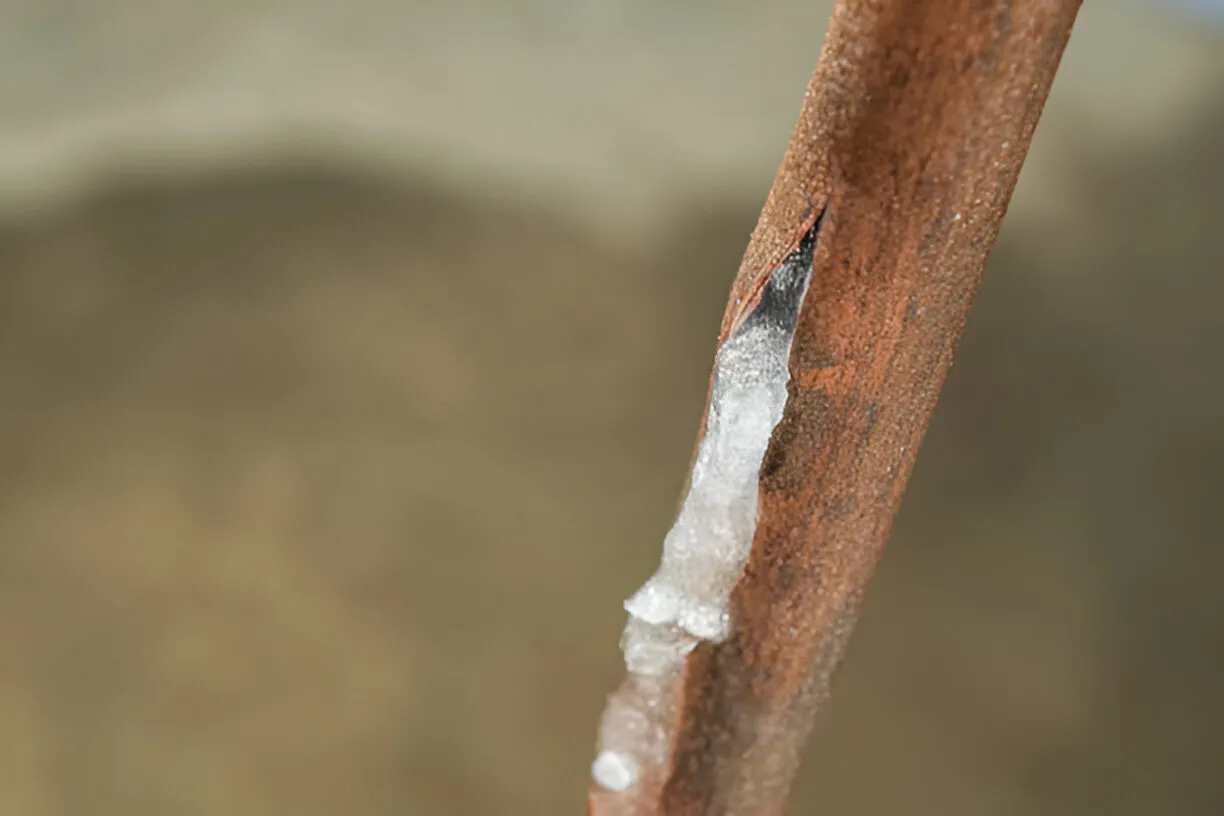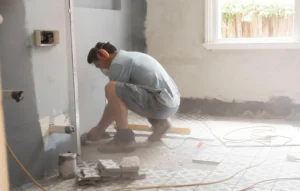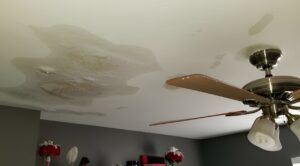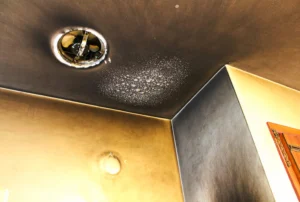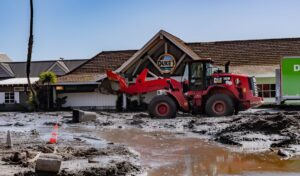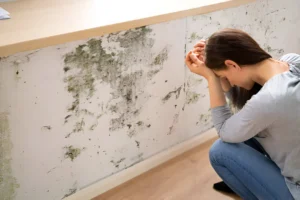Cincinnati winters can be beautiful, but the freezing temperatures can wreak havoc on your home’s plumbing. Every year, countless homeowners deal with frozen pipes that burst, leading to expensive water damage, stress, and major disruptions. Fortunately, with a little preparation, you can protect your home and avoid becoming part of that statistic.
At H20 Restoration, we’ve seen firsthand how damaging burst pipes can be. That’s why we want to share some simple, effective steps you can take to prevent frozen or burst pipes in Cincinnati winters.
Table of Contents
Why Pipes Burst in Winter
Before diving into prevention tips, it’s important to understand why this happens.
- Freezing water expands. When water inside your pipes freezes, it takes up more space and creates extreme pressure.
- Pressure builds up. Even the strongest pipes can’t withstand that kind of force. Eventually, they burst, spilling gallons of water into your home.
- Unheated areas are the biggest risk. Pipes in basements, attics, crawlspaces, garages, and exterior walls are most likely to freeze because they’re exposed to colder air.
Knowing this helps you focus your efforts where they’ll matter most.
Step 1: Insulate Your Pipes
One of the simplest and most affordable ways to prevent frozen pipes is insulation.
- Pipe insulation sleeves or foam tubing can be found at most hardware stores. Just measure your pipes and slide the insulation over them.
- Pay special attention to pipes along exterior walls, in unheated basements, crawlspaces, or garages.
- If you want extra protection, consider heat tape or heat cables, which plug into an outlet and keep the pipes warm.
Think of it like giving your pipes a winter coat.
Step 2: Seal Cracks and Drafts
Cold air sneaking into your home is one of the biggest culprits of frozen pipes.
- Check around windows, doors, and the foundation for cracks or gaps.
- Seal openings with caulk, spray foam, or weatherstripping.
- Pay extra attention to spots where pipes enter the home.
By blocking cold drafts, you’ll not only protect your plumbing but also save on heating bills.
Step 3: Keep Water Moving
Still water freezes faster than moving water. To avoid frozen pipes in Cincinnati winters, keep a trickle of water running when temperatures plunge.
- Let faucets drip slightly overnight during extreme cold snaps.
- Focus on faucets connected to vulnerable pipes (kitchen sinks, bathrooms along outside walls, etc.).
- The small increase in your water bill is nothing compared to the cost of repairing a burst pipe.
This simple step can make a huge difference.
Step 4: Keep the Heat On
You may be tempted to lower the thermostat to save money, but doing so can put your pipes at risk.
- Keep your home heated to at least 55°F, even if you’re away.
- Open cabinet doors under sinks to let warm air circulate around the pipes.
- If you’ll be gone for an extended time, consider a smart thermostat you can monitor remotely.
Consistent warmth is your best defense against frozen pipes.
Step 5: Disconnect and Drain Outdoor Hoses
Outdoor plumbing is especially vulnerable in Cincinnati winters.
- Disconnect garden hoses and store them before the first freeze.
- Shut off water to exterior spigots if possible.
- Drain the lines to make sure no water is left inside to freeze.
You can also install frost-proof hose bibs, which provide extra protection.
Step 6: Add Extra Heat in Trouble Spots
Some areas of your home may need a little extra help staying warm.
- Use a space heater in basements, crawlspaces, or garages (but always follow safety precautions).
- Heat lamps or infrared heaters can also provide targeted warmth.
- Never use open flames or unsafe heating methods—these can lead to fires or carbon monoxide poisoning.
Even a few degrees of extra warmth can prevent disaster.
Step 7: Know Where Your Main Water Shut-Off Valve Is
Even with all precautions, emergencies can still happen. If a pipe does burst, knowing how to shut off your main water supply quickly can save thousands of dollars in damage.
- Locate your shut-off valve (usually in the basement, crawlspace, or near the water meter).
- Make sure everyone in your household knows how to use it.
- Practice turning it off so you won’t be fumbling during an emergency.
This is one of the most important steps for protecting your home.
Step 8: Winterize When Traveling
If you’re heading out of town during the winter, your home will be at higher risk.
- Leave the heat set at 55°F or higher.
- Open cabinets under sinks.
- Ask a trusted neighbor or friend to check on your home, especially during a deep freeze.
- For extended trips, consider draining your plumbing system completely.
A little planning before you leave can prevent you from coming home to a flooded house.
What To Do If Your Pipes Freeze
Sometimes, despite your best efforts, pipes may still freeze. Here’s what to do:
- Turn on the faucet. If water only trickles out, the pipe is likely frozen.
- Apply gentle heat with a hairdryer, heating pad, or warm towels. Start near the faucet and work backward.
- Never use open flames like a blowtorch or lighter.
- Keep applying heat until water flows normally.
If you can’t locate the frozen area, can’t thaw it, or the pipe has already burst, call a professional immediately.
Why Burst Pipes Are So Dangerous
A small crack in a pipe can release hundreds of gallons of water in a single day. The damage spreads quickly:
- Floors, walls, and ceilings can be ruined.
- Mold growth can begin within 24–48 hours.
- Electrical systems and personal belongings may be destroyed.
That’s why prevention is always better than repair. But if the worst happens, quick action is key.
How H20 Restoration Can Help
At H20 Restoration, we specialize in water damage restoration in Cincinnati, and we’ve helped countless families recover from burst pipes.
Here’s what we offer:
- 24/7 emergency response to stop water damage in its tracks.
- Professional water extraction and drying to protect your home’s structure.
- Mold remediation services to prevent long-term health risks.
- A team of experienced, local experts who understand Cincinnati winters and know how to act fast.
We know how stressful water damage can be. That’s why our mission is to restore not just your home, but also your peace of mind.
Final Thoughts
Frozen and burst pipes are one of the biggest risks of Cincinnati winters, but with the right preparation, you can keep your plumbing safe.
To recap:
- Insulate your pipes.
- Seal cracks and drafts.
- Keep water moving during cold snaps.
- Maintain steady heat.
- Disconnect hoses and winterize.
- Be ready with your shut-off valve.
Taking these simple steps to prevent frozen or burst pipes will save you money, protect your home, and help you enjoy the winter season worry-free.
And if you ever find yourself dealing with water damage, remember that H20 Restoration is just a call away—ready to help you recover quickly and safely.

